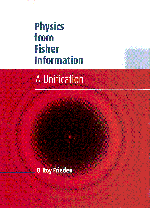Book contents
- Frontmatter
- Contents
- 0 Introduction
- 1 What is Fisher information?
- 2 Fisher information in a vector world
- 3 Extreme physical information
- 4 Derivation of relativistic quantum mechanics
- 5 Classical electrodynamics
- 6 The Einstein field equation of general relativity
- 7 Classical statistical physics
- 8 Power spectral 1/f noise
- 9 Physical constants and the 1/x probability law
- 10 Constrained-likelihood quantum measurement theory
- 11 Research topics
- 12 Summing up
- Appendix A Solutions common to entropy and Fisher I-extremization
- Appendix B Cramer–Rao inequalities for vector data
- Appendix C Cramer–Rao inequality for an imaginary parameter
- Appendix D Simplified derivation of the Schroedinger wave equation
- Appendix E Factorization of the Klein–Gordon information
- Appendix F Evaluation of certain integrals
- Appendix G Schroedinger wave equation as a non-relativistic limit
- Appendix H Non-uniqueness of potential A for finite boundaries
- References
- Index
7 - Classical statistical physics
Published online by Cambridge University Press: 30 January 2010
- Frontmatter
- Contents
- 0 Introduction
- 1 What is Fisher information?
- 2 Fisher information in a vector world
- 3 Extreme physical information
- 4 Derivation of relativistic quantum mechanics
- 5 Classical electrodynamics
- 6 The Einstein field equation of general relativity
- 7 Classical statistical physics
- 8 Power spectral 1/f noise
- 9 Physical constants and the 1/x probability law
- 10 Constrained-likelihood quantum measurement theory
- 11 Research topics
- 12 Summing up
- Appendix A Solutions common to entropy and Fisher I-extremization
- Appendix B Cramer–Rao inequalities for vector data
- Appendix C Cramer–Rao inequality for an imaginary parameter
- Appendix D Simplified derivation of the Schroedinger wave equation
- Appendix E Factorization of the Klein–Gordon information
- Appendix F Evaluation of certain integrals
- Appendix G Schroedinger wave equation as a non-relativistic limit
- Appendix H Non-uniqueness of potential A for finite boundaries
- References
- Index
Summary
Goals
Classical statistical physics is usually stated in the non-relativistic limit, and so we restrict ourselves to this limit in the analyses to follow. However, as usual, we initiate the analysis on a covariant basis.
The overall aim of this chapter is to show that many classical distributions of statistical physics, defining both equilibrium and non-equilibrium scenarios, follow from a covariant EPI approach. Such equilibrium PDFs as the Boltzmann law on energy and the Maxwell–Boltzmann law on velocity will be derived. Non-equilibrium Hermite–Gaussian PDFs on velocity will also be found. Finally, some recently discovered inequalities linking entropy and Fisher information will be derived.
Covariant EPI problem
Physical scenario
Let a gas be composed of a large number M of identical molecules of mass m within a container. The temperature of the gas is kept at a constant value T. The molecules are randomly moving and mutually interacting through forces due to potentials. The particles randomly collide with themselves and the container walls. All such collisions are assumed to be perfectly elastic. The mean velocity of any particle over many samples is zero.
Measurements E and μ are made of the energy and momentum, respectively, of a randomly selected particle. This defines an (energy,momentum) joint event, and is a Fourier-space counterpart to the (space, time) event characterizing the quantum mechanical analysis in Chap. 4. The measurements perturb the amplitude functions q(E, μ) of the problem, initiating the EPI process.
Information
- Type
- Chapter
- Information
- Physics from Fisher InformationA Unification, pp. 179 - 205Publisher: Cambridge University PressPrint publication year: 1998
